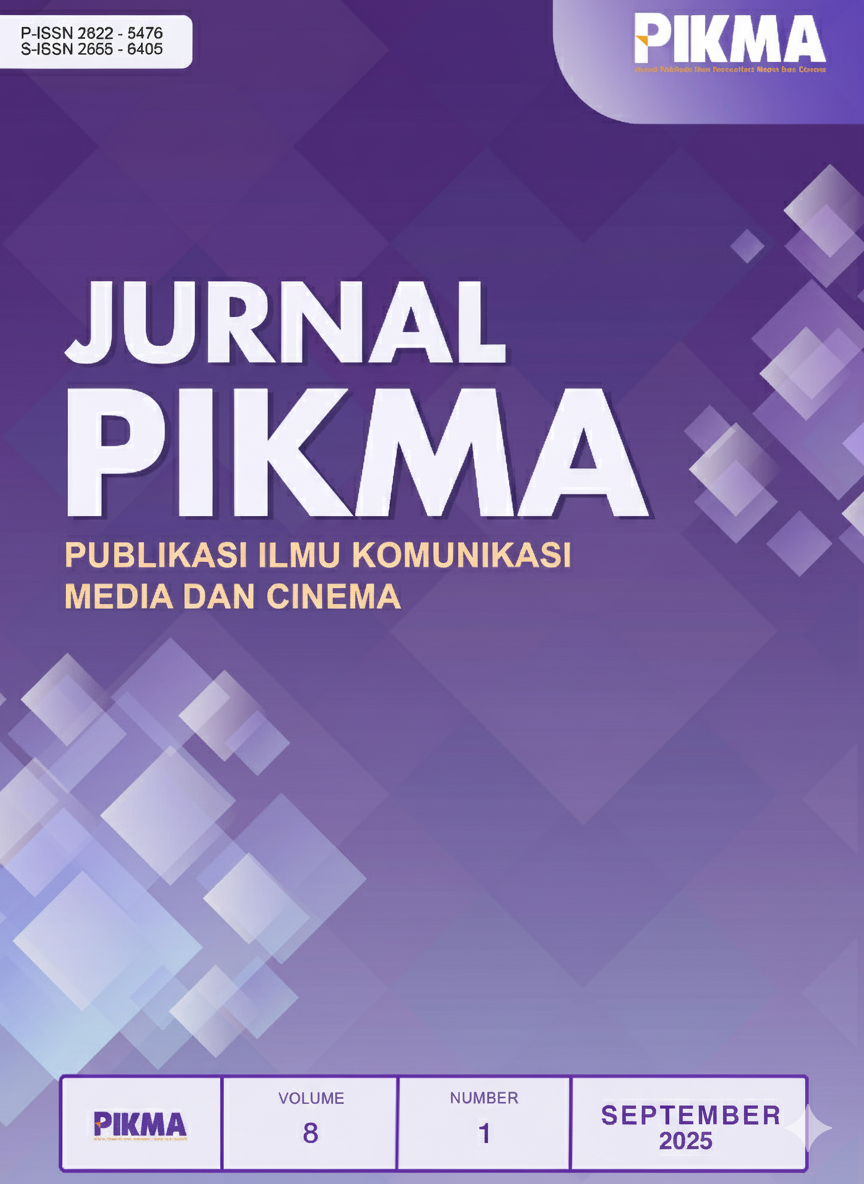Strategi Negative Word of Mouth dalam Pesan Persuasif Akun X @GerakanBDS_ID
DOI:
https://doi.org/10.24076/ywh4c444Keywords:
BDS, Boikot, Pesan PersuasifAbstract
Media sosial, khususnya akun X @gerakanbds_id, menjadi sarana penting dalam menyebarkan pesan persuasif aksi boikot produk berasosiasi Israel. Strategi Negative Word of Mouth (NWOM) digunakan untuk memobilisasi opini publik dan mendukung aksi kolektif melalui pesan yang memadukan kewajiban moral, solidaritas sosial, dan tekanan ekonomi. Metode kualitatif dengan pendekatan analisis konten diterapkan pada 10.214 unggahan periode April 2022–Januari 2025 yang dikumpulkan melalui web scraping dan dianalisis menggunakan model IndoBERT. Sebanyak 4.408 unggahan diidentifikasi mengandung NWOM, terdiri dari 195 unggahan berkategori kewajiban moral, 402 solidaritas sosial, dan 259 tekanan ekonomi. Hasil menunjukkan NWOM efektif membentuk kesadaran publik, memperkuat identitas kolektif, dan mendorong aksi boikot sebagai perlawanan terhadap ketidakadilan.
References
AJLabs. (2023, October 9). Israel-Gaza war in maps and charts: Live tracker. Al Jazeera. https://www.aljazeera.com/news/longform/2023/10/9/israel-hamas-war-in-maps-and-charts-live-tracker
Ardy, G. Des, & Natalia, E. C. (2022). Pengaruh Kampanye PR Gojek #PesanDariRumah terhadap Kesadaran Konsumen dalam Menaati Protokol Gojek J3K. Jurnal Komunikasi Pembangunan, 20(02), 192–206. https://doi.org/10.46937/20202240791
Ausat, A. M. A. (2023). The Role of Social Media in Shaping Public Opinion and Its Influence on Economic Decisions. Technology and Society Perspectives (TACIT), 1(1), 35–44. https://doi.org/10.61100/tacit.v1i1.37
Bublitz, M. G., Catlin, J. R., Jones, A. C., Lteif, L., & Peracchio, L. A. (2022). Plant Power : Seeding Our Future With Plant-Based Eating. In Journal of Consumer Psychology. https://doi.org/https://doi.org/10.1002/jcpy.1328
Christodoulides, G., Gerrath, M., & Siamagka, N. (2021). Don't be rude! The effect of content moderation on consumer-brand forgiveness. Psychology and Marketing. https://doi.org/https://doi.org/10.1002/jcpy.1328
Elshaer, I. A., Azazz, A. M. S., Fayyad, S., Kooli, C., Fouad, A. M., Hamdy, A., & Fathy, E. A. (2025). Consumer Boycotts and Fast-Food Chains: Economic Consequences and Reputational Damage. Societies, 15(5), 114. https://doi.org/10.3390/soc15050114
Fernandes, D. (2020). Politics at the Mall : The Moral Foundations of Boycotts. Journal of Public Policy and Marketing, 39(4), 494–513. https://doi.org/10.1177/0743915620943178
Haq, F. (2024, October 21). Daily Press Briefing by the Office of the Spokesperson for the Secretary General. https://press.un.org/en/2024/db241021
Indrayani, H., Nurlita, R., & Fitriani, J. D. (2020). Manajemen Strategis Public Relations Teori dan Praktik Corporate dan Government Public Relations.
Kania, R., & Salsabila, H. N. (2023). Responsive Strategy of Courier Services Companies on Handling Customer Complaint in Social Media : The Effect on Brand Trust and Customer Loyalty. Journal of Marketing Innovation (JMI), 3(1). https://doi.org/10.35313/jmi.v3i1.51
Mirbabaie, M., Stieglitz, S., & Marx, J. (2023). Negative Word of Mouth On Social Media: A Case Study of Deutsche Bahn's Accoutability Management. Schmalenbach Journal of Business Research, 75(1), 99–117. https://doi.org/10.1007/s41471-022-00152-w
Misidawati, D. N., Rahmawati, U., Kamaruddin, M. J., Tahalele, O., & Putra, J. E. (2024). PERAN MEDIA SOSIAL TERHADAP PENERAPAN BOIKOT PRODUK ISRAEL DI INDONESIA. In Universitas Pendidikan Indonesia (Vol. 1).
Muhamad, N. (2023, December 21). Kenapa Orang Indonesia Boikot Produk Pro Israel? Ini Surveinya. Databoks.
Mukhlis, I. (2024). INTEGRASI METODE KUANTITATIF DAN KUALITATIF.
Noviani Prasetyo, L., & Gamayanto, I. (2023). Detecting Netizen Motives and Communication Psychology on Social Media Mendeteksi Motif Netizen dan Psikologi Komunikasi di Media Sosial. Jurnal Audience.
Nugraha, A. H., Dalimunthe, K. L., Zainal Abidin, & Yuliana Hanami. (2024). Gerakan Sosial Aksi Boikot Melalui Social Identity Model of Collective Action Pada Isu Bela Palestina. Jurnal Socius : Journal of Sociology Research and Education, 11(2), 82–94. https://doi.org/10.24036/scs.v11i2.685
Ruhyandi, R., Nur Maulida, I., & Laili Rahmiyati, A. (2022). Pengaruh Promosi Kesehatan Menggunakan Media Video Terhadap Pengetahuan dan Sikap Ibu Rumah Tangga Tentang COVID-19. Garuda
Sampurno, M. B. T., Kusumandyoko, T. C., & Islam, M. A. (2020). Budaya Media Sosial, Edukasi Masyarakat, dan Pandemi COVID-19. SALAM: Jurnal Sosial Dan Budaya Syar-i, 7(5). https://doi.org/10.15408/sjsbs.v7i5.15210
Sekarwulan, A., Novita, Purwanto, H., & Safitri, D. (2020). Peran Instagram @p2ptmkemenkesri Sebagai Media Kampanye Kesehatan. Communications, 2(1), 1–15. https://doi.org/10.21009/communications.2.1.1
Ulya, H., & Riksaning Ayu, K. (2024). Gerakan Sosial Digital; Boikot-Divestasi-Sanksi (BDS) Terhadap Isu Israel-Palestina di Media Sosial.
Wang, Y., Lu, L., Zhou, Z., & Zhu, J. (2022). Empathic Narrative of Online Political Communication. Frontiers in Psychology, 13. https://doi.org/10.3389/fpsyg.2022.869496
Zhao, X., Guam, M., & Liang, X. (2022). The Impact of Social Media Use on Online Collective Action During China's COVID-19 Pandemic Mitigation: A Social Identity Model of Collective Action (SIMCA) Perspective. In International Journal of Communication (Vol. 16). http://ijoc.org.
Downloads
Published
Issue
Section
License
Copyright (c) 2025 Jurnal PIKMA : Publikasi Ilmu Komunikasi Media Dan Cinema

This work is licensed under a Creative Commons Attribution-NonCommercial 4.0 International License.









